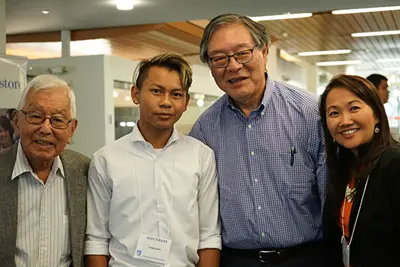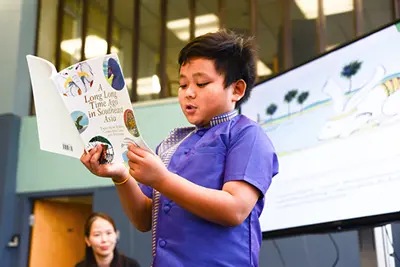New Center to Offer Help with Academics, Financial Aid, Career Prep and More
 Image by Tory Wesnofske
Image by Tory Wesnofske
11/02/2021
By Katharine Webster
The U.S. Department of Education (DOE) has awarded nearly $1.5 million to UMass Lowell to support Asian American and Pacific Islander students, most of whom come from Southeast Asian refugee families that have settled in and around Lowell.
The five-year grant will allow the university to open a center for Asian American students and Native American Pacific Islanders (indigenous people from Hawaii and U.S. territories in the Pacific) that will provide staff and peer support in accessing financial aid and academic, career and wellness services.
Vice Provost for Academic Affairs Julie Nash, the lead on the grant, says that while a growing number of Southeast Asian students have enrolled at UML over the past decade, the university wants to help bridge financial, language and cultural barriers so more of them can successfully complete college.
 Image by Tory Wesnofski
Image by Tory Wesnofski
“Now that we have this grant, thanks to years of foundational work by my three co-PIs, Asian American students will know that this is a place where they’ll be supported and have programs in place to help them thrive,” Nash says.
The three co-principal investigators are Sue Kim, associate dean of the College of Fine Arts, Humanities and Social Sciences; Education Assoc. Prof. Phitsamay Uy; and Leslie Wong, dean of Equity and Inclusion. Kim and Uy co-direct the university’s Center for Asian American Studies, where the grant originated, while Wong leads the Office of Multicultural Affairs. Robin Toof, co-director of the Center for Community Research and Engagement, will evaluate the new center and its programs.
UMass Lowell became eligible to apply for the 2020 DOE grant as a “minority-serving institution,” in this case a school where at least 10% of students are Asian American or Pacific Islanders and where there is demonstrated financial need among that population.
According to the most recent available data, 13% of UML undergraduates identify as Asian American, while fewer than 1% are Pacific Islanders. Many Asian Americans are transfer students from Middlesex Community College, also an Asian American and Pacific Islander serving institution.
 Image by Tory Wesnofske
Image by Tory Wesnofske
Uy says that Asian Americans overall have a reputation as an academically and financially successful “model minority,” largely because data on Southeast Asians is lumped together with data on ethnic East Asians (family countries of origin include China, Taiwan, Japan and Korea) and South Asians (India, Pakistan, Nepal and Bangladesh).
“It makes it look like we’re all doing well and don’t need help, but that’s not true,” Uy says. “Southeast Asian students need more personal care and attention due to their families’ lack of familiarity with the educational system. They often don’t have mentors who look like them and speak their (home) languages, and they are financially disadvantaged.”
Many Asian American students at UMass Lowell come from Southeast Asian refugee families who lost everything – family members, land, possessions, livelihoods and years of schooling – during the Vietnam War, the CIA’s secret war in Laos, or the Khmer Rouge regime in Cambodia, says Uy, who was born in Laos. More South Asian and East Asian American students come to UML from middle-class and wealthy communities, she says.
Lowell has the second largest population of Cambodian Americans in the U.S., as well as significant numbers of Vietnamese, Hmong and Lao refugees and more recent refugees from Myanmar, formerly known as Burma. These refugee families have suffered serious trauma, and that affects their children in multiple ways, Uy says.
 Image by Tory Wesnofske
Image by Tory Wesnofske
For example, Southeast Asian American students face additional challenges in completing the FAFSA – the federal form that determines whether they are eligible for government grants and loans, which is used by UML to decide on financial aid and scholarships – because of language barriers and their parents’ deep distrust of government, Uy says.
“In the past, whenever governments have asked for their information, it’s been used to harm them,” she explains.
Building on the Center for Asian American Studies and the programs offered by Multicultural Affairs – including a dozen student clubs for different Asian American ethnic groups – the new Asian American Center for Engagement and Excellence (AACEE, pronounced “ace”) will offer peer mentoring by older Asian American students trained to help with financial aid, wellness and academics, Kim says.
The center will partner with community organizations that can help bridge language and cultural gaps with families, Kim says. AACEE also will create mentoring programs and opportunities, drawing on successful Asian American alumni and community members who can serve as role models for current students.
A small amount of the grant money – $10,000 each year for five years, which the university must match through donations – will establish an endowment for scholarships for Southeast Asian American students. And Uy and the new AACEE project director will provide cultural competency training for faculty and staff.
 Image by Tory Wesnofske
Image by Tory Wesnofske
Kim says that many other students of color at UMass Lowell, as well as first-generation college students from all backgrounds, struggle with similar issues.
“We see this initiative as integral to the university’s new Diversity, Equity and Inclusion Action Plan,” she says. “UMass Lowell has been building and will continue to build programs to equip all our students to succeed.”
Uy has done research on dropout rates for Asian American high school students, and also did research with Kim and Chrisna Khuon ’17 on college readiness among Asian American students at UMass Lowell. Uy says the biggest barriers to college success among Southeast Asian Americans are low expectations and services in high school and a lack of family support.
“If your high school doesn’t prepare you and your family doesn’t support you, and now you’re at a school where you don’t have anyone who knows your name or your story, one bad bump in the road can cause you to leave college,” Uy says. “With our center, we hope they will see a familiar face and find the support they need.”
Kim, Uy and Wong helped Middlesex Community College, which has campuses in Lowell and Bedford, get a grant to open a center for Asian American and Pacific Islander students five years ago. That has bolstered the pipeline of transfer students prepared to finish their bachelor’s degrees at UMass Lowell: About 100 Asian American students transfer from Middlesex to UML each year, Wong says.
The DOE’s formal recognition of UML as a minority-serving institution opens the door to other federal grants to help underserved groups, as well.
Just last month, the university was awarded more than $3 million by the U.S. Department of Health and Human Services to establish new programs in public health informatics, with a focus on training a diverse workforce for vital jobs. The grant includes Middlesex and Northern Essex community colleges. Northern Essex, with campuses in Haverhill and Lawrence, is a designated Hispanic-serving institution.




